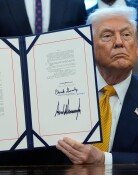Share of Korea’s unicorn companies halves in 5 years
Share of Korea’s unicorn companies halves in 5 years
Posted June. 22, 2023 07:59,
Updated June. 22, 2023 07:59
The growth of unicorn companies, which refer to innovation-leading start-ups with a corporate value of over one trillion won, has been stalling in South Korea. According to the analysis of the U.S. market research company CB Insights’ data by the Federation of Korean Industries, the number of unicorn companies in the world rose from 449 to 1,209 during the last five years, while that of South Korea only increased from 10 to 14 during the same period. The share of South Korean unicorn companies dropped from 2.2 percent to 1.2 percent.
The growth of South Korean unicorn companies also decreased. The share of South Korean companies in the corporate value of unicorn companies across the world declined from 2.1 percent to 0.8 percent. It is also problematic that such a handful of unicorn companies are concentrated in a few industries, including e-commerce. There is only one South Korean unicorn company in the fintech industry, which has the largest number of unicorn companies globally, and there is none in the fields of artificial intelligence, healthcare, and data management and analysis, which are expected to experience rapid growth.
The South Korean ecosystem for starting and growing start-ups had still many challenges. It is tightly regulated, making it difficult for unicorn companies to emerge with innovation. As in the case of ride-sharing service TADA, which was acquitted after four years, start-ups are struggling with laws, regulations, and conflicts with existing businesses when they need to focus on innovation. Remote medical service start-ups are closing their businesses as the legalization of non-face-to-face treatment is getting delayed. While the online legal help platform Lawtalk has been having issues with the Korean Bar Association for nine years, the National Assembly just began to discuss the revision of the Attorney-at-Law Act.
In addition, the regulation sandbox introduced by the government to temporarily postpone regulations for innovative businesses is being criticized for providing ‘false hope.’ As there is no practical regulation improvement, many aspiring businesses are stopped in the demonstration stage before commercialization. Some analyzed that 55 out of the top 100 unicorn companies in the world could not have made it due to regulations if they had started business in South Korea.
Major companies in the world are sparing no policy support to grow unicorn businesses. The French president even announced that he would personally make efforts to make France the country of unicorns. The country had only three unicorn companies in 2017 and now has 26. South Korea should also overhaul outdated regulations and ensure that venture companies get enough investment. Start-ups, which will drive the future growth of the country, should be freed from the shackles and fly high.







